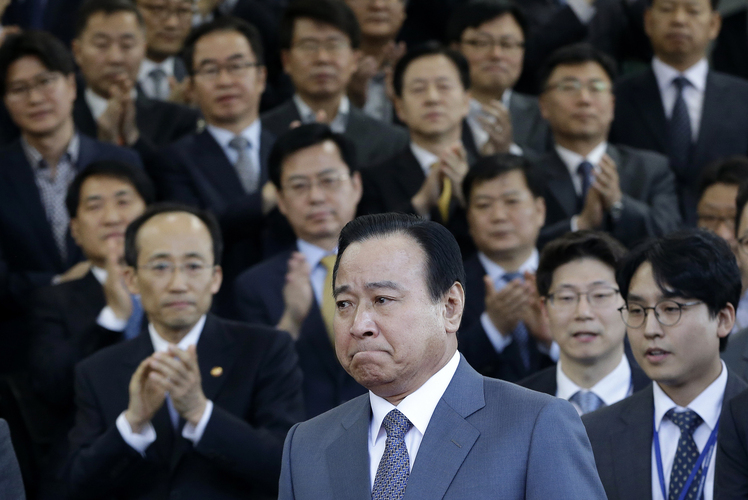- California Assembly OKs highest minimum wage in nation
- S. Korea unveils first graphic cigarette warnings
- US joins with South Korea, Japan in bid to deter North Korea
- LPGA golfer Chun In-gee finally back in action
- S. Korea won’t be top seed in final World Cup qualification round
- US men’s soccer misses 2nd straight Olympics
- US back on track in qualifying with 4-0 win over Guatemala
- High-intensity workout injuries spawn cottage industry
- CDC expands range of Zika mosquitoes into parts of Northeast
- Who knew? ‘The Walking Dead’ is helping families connect
Park accepts prime minister’s resignation over bribery scandal

South Korean Prime Minister Lee Wan Koo, bottom center, leaves the Central Government Complex after his farewell ceremony in Seoul, South Korea Monday, April 27, 2015. South Korean President Park Geun-hye on Monday accepted the resignation offer by her prime minister over a bribery scandal. (AP Photo/Ahn Young-joon)
SEOUL, South Korea (AP) — South Korea’s president accepted the resignation of her prime minister on Monday over a bribery scandal, officials said.
Prime Minster Lee Wan-koo offered to resign last week, just two months after taking the country’s No. 2 post. He has been at the heart of a corruption scandal involving a dead businessman and other high-profile figures, mostly close associates of President Park Geun-hye.
The scandal is a blow to Park’s government, which is still reeling from lingering public criticism of its handling of a ferry disaster last year that killed more than 300 people. Violence occurred during a Seoul rally earlier this month by relatives of the ferry victims and their supporters, leaving dozens of people injured.
Businessman Sung Wan-jong said before committing suicide this month that he gave 30 million won, or about $27,390, to Lee in 2013.
South Korean media have reported evidence of ties between Sung and Lee, but Lee has denied the bribery allegation.
President Park’s office said she accepted Lee’s resignation, but didn’t announce his replacement.
Lee’s office confirmed his departure, saying he left his office after making a farewell speech.
Executive power in South Korea is concentrated in the president, but the prime minister leads the government if the president becomes incapacitated.















